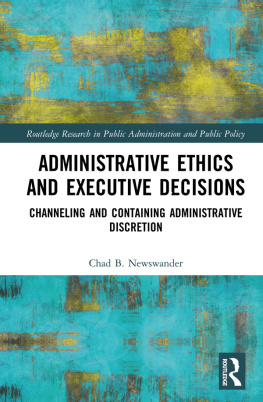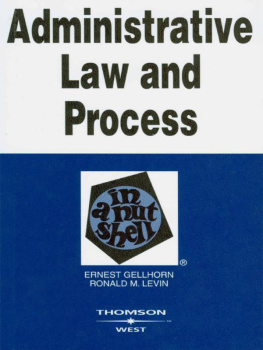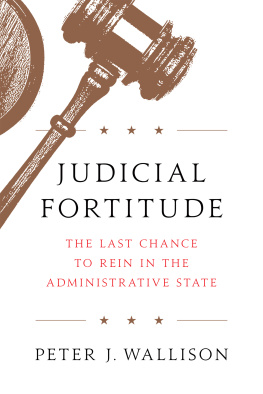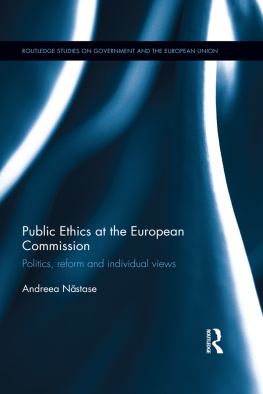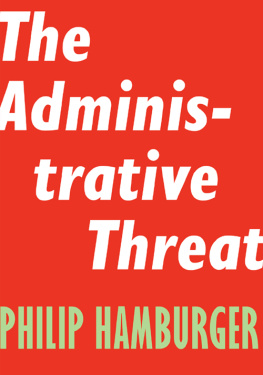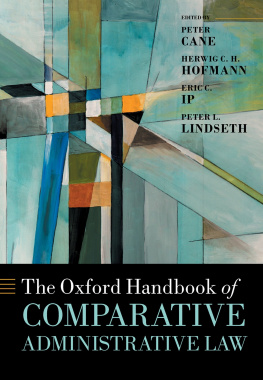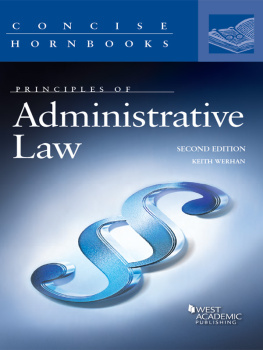Administrative Ethics and Executive Decisions
Chad Newswanders fine book does something remarkably prudent: it puts civil servants at the heart, but not the helm, of the constitutional order. Through theoretical argument and practical example, he shows how their exercise of administrative discretion can be virtuous while staying in tune with the highest law of the land. A welcome next step in the development of a Constitutional School in public administration.
Patrick Overeem, Assistant Professor of Political Theory, Vrije Universiteit Amsterdam
Bridging constitutional theory with constitutional practice, Newswander underscores the complexity of public sector decision making and the multitudinous challenges associated with the democratic governance process. His ability to demonstrate the connection between theory and practice makes this book a must read for academics, practitioners, and students of U.S. public administration.
Stephanie P. Newbold, Associate Professor of Public Affairs & Administration, Rutgers University
As first responders to public problems, administrators must survey situations, identify solutions, and occasionally make executive decisions that are binding upon the government as a whole. The ability for administrators to assert claims that orient the government in a particular direction is not only powerful, but it can also be problematic and even dangerous.
For administrators, the tension between moving in a spirited way and remaining sensible is a problem of how to exercise ones discretion, especially in the U.S. context, which demands that both be considered and actualized. In dealing with these competing expectations, Chad B. Newswander analyzes how administrators can incorporate executive, legislative, and judicial tendencies to help them handle the problem of discretion.
Expanding the thinking of the constitutional school of public administration thought, Administrative Ethics and Executive Decisions is a theoretically grounded and empirically rich study of how administrators incorporate a constitutional ethos to handle the problem of discretion.
Chad B. Newswander is a professor of Political Science at Brigham Young UniversityIdaho. His research focuses on administrative statesmanship, administrative ethics, administrative law, public administration education, and constitutional governance. His work has been published in Public Administration Review, Administration & Society, American Review of Public Administration, Administrative Theory & Praxis, and other outlets.
Routledge Research in Public Administration and Public Policy
7Block Granting Medicaid
A Model for 21st Century Health Reform?
Edward Alan Miller
8Toward Resilient Communities
Examining the Impacts of Local Governments in Disasters
Christopher L. Atkinson
9Local Disaster Resilience
Administrative and Political Perspectives
Ashley D. Ross
10Does Government Need to Be Involved in Primary and Secondary Education
Evaluating Policy Options Using Market Role Assessment
Michael T. Peddle
11Environmental Justice through Research-Based Decision-Making
William M. Bowen
12The Politics of Foster Care Administration in the United States
Rebecca H. Padot
13Advancing Collaboration Theory
Models, Typologies, and Evidence
Edited by John C. Morris and Katrina Miller-Stevens
14Anticipatory Policymaking
When Government Acts to Prevent Problems and Why It Is So Difficult
Rob A. DeLeo
15Administrative Ethics and Executive Decisions
Channeling and Containing Administrative Discretion
Chad B. Newswander
First published 2018
by Routledge
711 Third Avenue, New York, NY 10017
and by Routledge
2 Park Square, Milton Park, Abingdon, Oxon, OX14 4RN
Routledge is an imprint of the Taylor & Francis Group, an informa business
2018 Taylor & Francis
The right of Chad B. Newswander to be identified as author of this work has been asserted by him in accordance with sections 77 and 78 of the Copyright, Designs and Patents Act 1988.
All rights reserved. No part of this book may be reprinted or reproduced or utilized in any form or by any electronic, mechanical, or other means, now known or hereafter invented, including photocopying and recording, or in any information storage or retrieval system, without permission in writing from the publishers.
Trademark notice: Product or corporate names may be trademarks or registered trademarks, and are used only for identification and explanation without intent to infringe.
Library of Congress Cataloging-in-Publication Data
A catalog record for this book has been requested
ISBN: 978-1-138-28070-0 (hbk)
ISBN: 978-1-315-27179-8 (ebk)
Typeset in Times New Roman
by Apex CoVantage, LLC
The Federalist Papers begins its defense of the proposed U.S. Constitution with an assertion about what it takes to produce good government.1 The author of these papers, Publius, argues that decisions that lead to good government must be rooted in reflection and choice, not in accident and force.2 The distinction between reflection and accident, or between choice and force, serves to demarcate an important reality about the perils of political life.3 Servants of any regime will confront unpredictable forces that require a discretionary response. Reliance on rote routines or previous plans may be inadequate in dealing with novel and changing situations. One way to react in such moments is to be swept up by out-of-control events. The power of a situation can drown out choices, especially those of a moral sort.4 Another way to react to urgent circumstances is to claim ownership over ones responses. This requires taking a stand, rooted in thoughtful consideration of what should be done. Deliberation of this sort, however, should not curtail or impede timely action. Publius was clear on this front, pointing out that achieving security necessitated robust action on part of the government.
The setup of a constitutional government that encourages energized movement and careful reflection is what enables good government to be secured and even to flourish. Unexpected moments call upon officials to vigorously exercise their discretion and to make sound, defensible decisions. Now, administrators experience the crosscurrent pressures that require government actors to be energetic yet thoughtful. As first responders to public problems, they must survey situations, identify solutions, and occasionally make executive decisions that are binding upon the government as a whole. A police officer may have to determine whether to use deadly force, and a district attorney may have to decide whether to indict said officer in the midst of a political firestorm for such an act. A social worker may have to begin the process of stopping the flow of public benefits to a family that may no longer qualify for them, knowing that it might put a child on the street. The next day, a different social worker might have to decide whether to recommend placing a child in state custody due to parental negligence. An intelligence officer may have to decide whether to turn a blind eye to atrocious behavior, because a person offers valuable information that may save lives.

